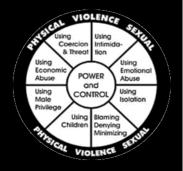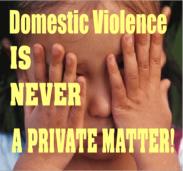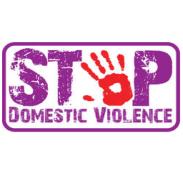 |
| You Can Help Stop Domestic Violence |
It can be very difficult to know just what to do when someone you
care about is a victim of domestic violence, whether you are a close
friend or a family member. The sad truth is that sometimes she may not
even see herself as a victim or view her partner as a batterer.
You
must remember in many violent and abusive relationships it is just as
important to know what not to do in your efforts to help.
Some things you can do to help a domestic violence victim:
You
may ask general questions like, "How's the marriage/relationship
going?" or you can ask specific questions - "Has he ever pushed or hit
you?", "Has he ever tried to intimidate you or call you names?". It is
very important to understand that domestic violence doesn't always begin
with physical violence and you must recognize some of the early warning
signs of a possible violent relationship.
- Know the effects of domestic violence
Education
is critical to any help you might give to the victim. You need to
understand that domestic violence can have serious and dangerous
physical and emotional effects on everyone in the household. Share what
you have learned with the victim because information can be a very
powerful tool in helping her recognize and protect herself against any
future violence.
- Trust the victim's knowledge
You must
respect her choices about when she can or can't take certain steps. She
is the expert here and she understands the relationship more than anyone
else. She knows the safest time to take action.
- Always give her positive feedback
Constantly
remind her of her strengths and abilities. If she has suffered physical
and emotional abuse for any amount of time, her self-esteem is very low
and she may even blame herself for the violence. She may be scared to
step out on her own. Make use of the words "I" or "I'm" - "I care about
you." "I'm very concerned about your safety.", "I'm afraid the next call
I get will be that you are seriously injured." Let her know that she is
important to you.
Always be a good listener,
let her talk and when its time for you to speak do not be judgmental in
any way. The victim may have left the abuser before and then returned to
the violence. You must understand that leaving takes time, sometimes
years. It is easy to lose patience with some domestic violence victims,
but leaving is a process and you must recognize your boundaries in order
for you to always be supportive.
- Help the victim develop a safety plan
A
safety plan will help the victim know what to do and how to do it when
she is faced with a violent situation. Your local domestic violence
shelter or state coalition against domestic violence will help you
understand this important plan.
If you
hear or witness a violent incident, don't hesitate to dial 911
immediately. When the police arrive, cooperate with them and ask to fill
out a statement. You want to be able to document the violent episode
and be prepared to testify in court.
Some things you "Should Not" do in trying to help a domestic violence victim:
- Never criticize the abusive partner
Remember,
the victim chose her partner and when you say critical things about the
abuser you are applying those same critical comments to the victim.
Many abusive partners isolate their victims by telling them that no one
likes him and everyone wants to see them split up. When she hears your
criticisms, she feels that he was right. The victim will not continue to
come to you if she feels that all you are going to do is criticize.
- Don't try to intervene physically
Trying
to overpower the abuser just might cause injuries or death to you, the
abuser, or the victim. Call 911, that's a policeman's job.
- Don't make choices for the victim
She
is living with someone who never lets her make her own choices and when
you give her orders or ultimatums, you are only repeating that violent
behavior. Trust her knowledge and support her in her decisions.
Domestic
violence is at epidemic levels in the United States and probably the
best thing any of us can do to stop the violence is to learn about it
and get involved. Just think about it - What would it be like to get off
work in the afternoon and be afraid to go home? or worse still, What if
your partner kept you confined to your house and wouldn't allow you to
have a job? How does it feel to be scared to go to sleep or wake up in
the mornings?
For a woman to finally decide to leave a violent
relationship takes a tremendous amount of strength and courage. We must
instill that courage in more domestic violence victims by letting them
all know that we do care about them, we support them, and make them
clearly understand that the violence isn't their fault.
=================================================================
If you are a business owner and haven't adopted any particular cause or campaign, why not
get involved in promoting domestic violence awareness? When businesses work together, great things can happen. The only way we can help stop domestic violence is to talk about it. There is someone in your community who is living in a violent relationship. Please join me on
LinkedIn and
Google+.--Ken
Other domestic violence information
|





